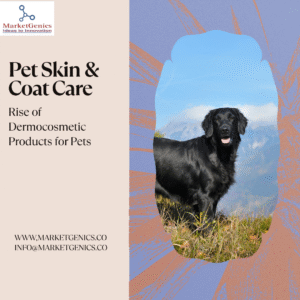Pet Skin & Coat Care: Rise of Dermocosmetic Products for Pets
Pet Skin & Coat Care: Rise of Dermocosmetic Products for Pets
Overview
Contemporary pets are exposed to allergens, pollution, and unhealthy diets, which in most cases lead to chronic skin problems. Some of the conditions affecting pets today include flea allergy dermatitis, atopic dermatitis and contact dermatitis. This has made a multitude of pet owners explore grooming solutions that would aid in solving these issues without the harsh use of chemicals or steroids.
High-quality skincare made of ingredients recommended by a veterinarian is becoming the subject of interest, especially in premium pet care. This transformation is related to the fact that people consider pets as family members. Just like majority of individuals nowadays prefer to use organic and natural skincare on themselves, they also want the same products to be used on the pets. Owners are preferring to employ pH-balanced formulations that are made of oatmeal, aloe vera, tea tree oil, and ceramides, and omega fatty acids. These components are used to soothe the skin, reduce the irritation, and add hydration.
Approved vets direct-to-consumer brands are increasing at a rapid pace and providing more customized dermocosmetic choices. Some companies in this area now rely on online stores monthly plans, and mobile apps to give custom skincare guidance. They design these plans based on a pet’s breed, age daily routines, and medical history. This change has led to customers becoming more aware and interactive, which helps boost steady progress in this industry.

A Look at the Products
The pet dermocosmetics market is expanding and offers many choices to prevent or treat skin problems This market comprises a large share of medicated conditioners and shampoos. They are used in managing skin infections caused by yeast, fungus or bacteria as well as causing irritated skin to calm down. Such shampoos and conditioners include chlorhexidine, ketoconazole or miconazole. They recommend them to treat recurring skin conditions in pets, recommended by Vets. The other important sub-group is creams and ointments used to cure certain skin issues such as hot spots, wounds, eczema, and allergies.
These drugs tend to combine medicines, antiseptic, and traces of corticosteroid in the hope that pets can speed up their recuperations with the minimal possibility of extreme side effects. Skin and coat supplements are on the increase nowadays. Individuals buy powders, capsules or chews that have omega-3 and omega-6 fatty acids, biotin, zinc and vitamin E. These supplements have been known to enhance the shininess of coat and to aid internal inflammatory problems.
When pets have sensitive skin or when they experience dry or itchy skin in winter, pet owners usually use sprays, balms, or mists as moisturizers. Even some of these products contain UV protectants to assist pets that have thin fur or fair skin. More companies now create hybrid products that mix healing benefits with cosmetic uses.
Regional Outlooks
People are using dermocosmetic pet products more and more around the world, but the pace is not the same everywhere. In North America, owners spend the most because they can visit vets and are ready to pay for premium pet care. The U.S. leads this trend with the rising demand for subscription skincare plans online vet consultations, and breed-specific items.
In Europe, many prefer pet products that are organic and cruelty-free while also being kind to the planet. Strict regulations and widespread pet insurance play a big role in pushing the popularity of well-tested items there.
In the Asia-Pacific region, countries like China, Japan, South Korea, and India are growing . Urbanization and higher earnings are pushing this growth, along with more people following Western habits in pet care. Smaller families and single-person households also lead to more spending on grooming and skincare for pets.
Future Changes
The dermocosmetic market for pets is heading toward major breakthroughs due to science and new digital tools. A growing trend is the development of microbiome-based skincare made for pets. This aims to protect the skin’s natural bacteria to prevent infections and swelling. While already common in human skin products, it is now becoming a big topic in pet dermatology.
AI and data-driven tools are finding new ways to craft personalized skin care solutions. Apps and devices that study skin problems through photos breed specifics, geography, and visible symptoms could soon help pet owners pick better products with less hassle.
Collaboration between veterinary clinics and skin care brands builds trust and highlights how well these products work. Companies prioritizing education on skin health and investing in research are likely to drive this industry’s growth .
Conclusion
The rise of dermocosmetic products in pet care reveals a big shift in the industry toward customized, preventive, and scientific wellness solutions. The demand for improved skin and coat care is growing because pet owners are more concerned about their pets’ health and gaining better knowledge about it. With more progress, awareness, and accessible options, the pet dermocosmetic market is set to transform grooming and veterinary skincare.
MarketGenics shines as a leading research firm offering valuable insights into the pet dermocosmetic industry. It relies on in-depth studies of customer behavior and forecasts of future trends to achieve this. MarketGenics designs data-driven strategies to help companies develop new concepts adapt to shifting customer demands, and stay competitive in a expanding market.
